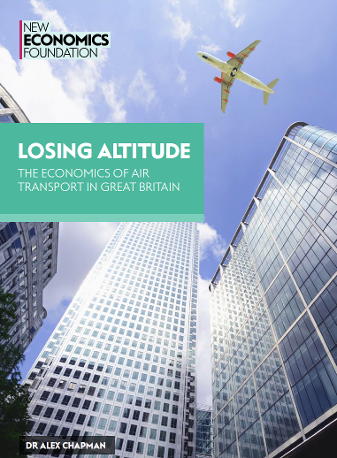Economy and Employment
‘The New Economics Foundation has today released a critical report soundly challenging the Economic and Employment claims of the industry...
This is the first comprehensive analysis of the economic costs and benefits of the UK air travel sector since the government published the Aviation Policy Framework a decade ago. It was peer-reviewed by the respected economist John Siraut, and casts doubt on many of the aviation industry’s key claims.’
The report is published HERE
GACC is challenging the quality of Gatwick’s consultation
GACC has commissioned a detailed report on Gatwick's Economy and Employment claims from the highly respected New Economics Foundation. The full report is available HERE.
The details below are prepared from the report
Economic benefits: business and the economy
Gatwick’s assessment of the economic benefits and costs of the proposed development is based on unsupportable assumptions, omissions and errors. We note the following points in particular:
- The assessment assumes the Covid-19 pandemic will have no medium to long-term impact on passenger demand. This is wholly inconsistent with the experience following previous economic/societal shocks, including at Gatwick Airport, and with the views of most informed commentators and the government. It is not a plausible basis for evaluating the proposed development. Gatwick should test an alternative scenario in which the pandemic has a more significant lasting impact on air travel than has been explored in the presented scenarios.
- Gatwick has assumed that the airport’s total proportion of business passengers will remain at around 13% and that there will be an absolute increase in business passenger numbers of around 1.5 million from 2032 onwards. There is extensive evidence that UK business travel had stagnated prior to the pandemic (total UK business air travel has never regained its 2006 peak) and it is very widely expected that business travel will decline materially post-COVID. There can therefore be no confidence of any growth in business air passenger travel as a result of this project. Even if there was growth in Gatwick business traffic, it is likely that this would be displaced from other airports and therefore have no net national economic benefit.
- Asserted business travel benefits make up between 65% and 75% of the proposed scheme’s total user benefits, which in turn make up virtually all the scheme’s claimed net social benefits and net present value. All of these numbers should be re-presented using alternative more realistic assumptions reflecting zero business travel growth or a decline in business passenger numbers.
- Many of the claimed economic benefits of the proposed scheme arise from the displacement of activity from other parts of the economy and other regions. Displacement is unlikely to be consistent with the government’s levelling up agenda. In addition, displacement from other airports to Gatwick is implausible: Gatwick has recovered more slowly from the pandemic than any other major UK airport suggesting it is not preferred by airlines and that its ability to attract traffic from them will be limited.
- No assessment of the impact of the proposed expansion on the UK tourism economy has been conducted. Given the fact that Gatwick’s main function is to move UK residents overseas on international leisure trips this is highly irregular and contravenes guidance in both the Treasury’s Green Book and the Department for Transport’s Transport Analysis Guidance. Gatwick must set out expected changes in outbound tourist trips, quantify their impact on the UK’s tourism economy and balance of trade and analyse these against the government’s tourism policies. It is likely that the incentivisation of outbound tourism arising from the proposed project would cause significantly negative impacts that have been omitted from Gatwick’s analysis.
- Gatwick’s estimate of the monetised value of the greenhouse gas emissions resulting from the project is incorrect, based on flawed methodology and uses out-of-date input values. Use of the correct carbon values for appraisal will significantly increase the net present value of carbon costs. The carbon costs calculation must be re-run using current values and actual emissions forecasts for every year for which they are available rather linear interpolation between years.
- International emissions (specifically inbound flights) and aviation’s non-CO2 climate impacts have been omitted in contradiction of government guidance. The value of non-CO2 climate impacts should be quantified and shown alongside the carbon costs. The value of the emissions resulting from inbound air traffic movements should be quantified and presented in the economic analysis.
- Gatwick’s presumption that airport expansion has positive national economic benefits is neither substantiated nor supported by the evidence in the latest academic literature or the evidence presented by Oxera. Many studies have struggled to identify a causal relationship between higher air passenger numbers and increased GDP growth in more developed nations. Some studies have found a negative relationship, with others suggesting this may link to the extractive impacts of aviation in regions with a heavy bias towards outbound tourism. Oxera’s estimate that output increases associated with the project are worth £4bn to £5.8bn is based on the application of a simple multiplier which was calibrated in 1999 and may no longer be applicable.
- Gatwick’s estimate of £4.7bn of government revenue benefits is unsubstantiated and not supported by Oxera’s analysis. Oxera explain that potential increases in Air Passenger Duty receipts cannot be considered to equate to overall gains in government tax revenues because they may be offset by reduced tax take in other areas of the economy. This error should be corrected. It is possible that the scheme could result in a net reduction in tax revenues.
Correction of the above unsupportable assumptions, omissions and errors would have a very significant effect on the overall benefit-cost ratio of the proposed scheme. It is likely that the scheme in fact has a negative net present value and therefore represents a highly unattractive proposition from a public interest perspective. These factors and others are set out more fully in the economic analysis carried out for the Gatwick Area Conservation Campaign by the New Economics Foundation which we are submitting as part of our response and which Gatwick must address fully.
Economic benefits: jobs and skills
Gatwick’s presentation of the potential employment benefits of the proposed development is materially misleading.
The airport’s consultants, Oxera, state that they do not expect the proposed scheme to result in material net job creation at the national level. This is because most jobs that might be created by the project would be displaced from other parts of the economy and other regions. Nonetheless Gatwick claims in the consultation overview document that “Additional jobs generated by the Project are expected to increase overall employment and generate additional value”. This statement is not supportable and is therefore misleading.
Given the lack of national level job creation associated with the proposed scheme, any local or regional job creation would be at the expense of other regions. It would therefore be likely to be inconsistent with the government’s levelling up agenda.
The economic and employment projections developed by Oxera and presented by the airport are subject to significant uncertainty and cannot in our view currently be relied upon. In particular Oxera’s work:
- has provided no evidence of a causal link between air travel growth and employment growth;
- is based on dated studies that do not adequately reflect more recent emerging evidence of the saturation of developed country transport markets and may not be appropriate for application in 2021; and
- fails to present a number of more recent peer-reviewed studies which could not evidence a causal link between air travel growth and employment.
In addition Oxera have failed to take any account of the employment impacts on the UK tourism economy of increasing outbound tourist trips and must do so.
We are submitting with our response a report by consultants the New Economic Foundation that expands on these comments.
Oxera’s work may also underestimate the effects of the airport’s and the broader aviation industry’s drive to automate jobs, which is likely to accelerate as a result of the pandemic. The long term ‘job intensity’ of aviation (i.e. the number of jobs per passenger) has been falling consistently for more than a decade.
Finally, we do not support the notion that it is a good economic strategy to increase the dependence of the local economy on additional employment at or related to Gatwick. The extreme vulnerability of the local economy to airport-related jobs has been reflected in higher unemployment around Gatwick than other regions throughout the Covid-19 crisis. Instead of the increased economic reliance on Gatwick that this development would lock in, we believe the local economy would be better served by economic diversification created by responding to the climate emergency. This alternative will increase long-term economic resilience, as set out in the Green New Deal for Gatwick report available HERE
PROTECTING THE GATWICK AREA

GACC Campaign Office
2 Glovers Gate, Glovers Road, Charlwood, Surrey. RH6 0EP
Telephone: 01293 862821
© Copyright Gatwick Area Conservation Campaign

